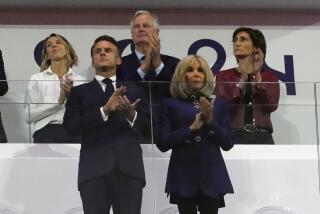France’s Finance Chief Picked as New Premier : Politics: Mitterrand chooses a self-taught economist to replace Cresson and resuscitate the ruling party.
- Share via
PARIS — Struggling to revive his flagging 11-year rule, French President Francois Mitterrand on Thursday named Finance Minister Pierre Beregovoy as prime minister, replacing embattled, unpopular Edith Cresson, who lasted only 10 months as the country’s first woman head of government.
The appointment of Beregovoy, 66, a self-taught economist credited with holding a lid on inflation, was promptly welcomed in the financial community. Beregovoy, the sixth prime minister to serve under Mitterrand since 1981, promised a “new, rejuvenated and totally united team” for his government.
After his Socialist Party made its worst showing in 24 years in recent regional elections, finishing even behind the ultra-right National Front party in the Ile de France region surrounding Paris, Mitterrand was under pressure to demonstrate reform.
By dumping Cresson, 58, whose public approval ratings had dropped below 20%, and replacing her with Beregovoy, a politician whose popularity bridges party lines, the French president hopes to rebuild the Socialist Party’s image before parliamentary elections next March.
Beregovoy’s Cabinet, announced late Thursday, includes three high-profile personalities whose appointments are aimed at boosting the media exposure of the new government.
The popular Culture Minister Jack Lang, who recently caused a stir by honoring American actor Sylvester Stallone as an “officer of arts and letters,” was given the key portfolio of education to add to his cultural responsibilities.
Dr. Bernard Kouchner, outspoken founder of Doctors Without Borders, an international program of medical assistance, was named minister of health.
And millionaire businessman-promoter Bernard Tapie, owner of the Adidas sports equipment empire as well as of France’s most successful soccer team in Marseilles, was named minister for cities.
Michel Sapin, junior justice minister in Cresson’s outgoing government, took over from Beregovoy as economy and finance minister.
Roland Dumas, who has a difficult relationship with Secretary of State James A. Baker III, remains as minister of foreign affairs, and Pierre Joxe keeps his position as minister of defense.
Opposition leaders generally reacted to the choice of Beregovoy--in the words of one of them--as the “least bad” selection available to Mitterrand.
“In any other time,” centrist opposition leader Pierre Mehaignerie said, “the choice of Monsieur Beregovoy as prime minister would have been considered reasonable. But (in regional elections March 22 and 29) the French people have just heavily rejected a Socialist Party that has run out of gas.”
Polls show that if parliamentary elections were held today, the result would be a substantial victory for the moderate right-wing opposition, an alliance formed by the Gaullist Rally for the Republic (RPR) party headed by former Prime Minister Jacques Chirac and the Union for French Democracy (UDF) under former President Valery Giscard d’Estaing. An opinion poll published by the rightist newspaper Figaro showed that the moderate right would win 371 seats in the 577-seat National Assembly.
The 75-year-old Mitterrand’s term does not expire until 1995, but many believe he would leave office early if the Socialists were to lose the parliamentary election rather than suffer the humiliation of sharing power with an opposition-led government as he did in the so-called cohabitation period of 1986-88.
After letting it be known that a government change was imminent, sparking a fury of speculation about Cresson’s replacement in the French press, Mitterrand took three days to announce his choice. A man often mentioned in that speculation, European Commission President Jacques Delors, made it clear he wants to remain in the Brussels-based job until his term expires in December.
In a political system that generally favors graduates of elite schools and universities, Beregovoy, born Dec. 23, 1925, to Ukrainian immigrant parents in the small Normandy town of Deville-les-Rouen, is a prominent exception. He is one of the few politicians with a working-class background in the Socialist Party.
Leaving school without the French equivalent of a high school diploma, Beregovoy first went to work in a factory as an apprentice lathe operator at age 16.
During World War II, he worked for the French railroad and served the French Resistance by reporting troop and convoy movements. After the war, he began work at the state-owned natural gas company, Gaz de France, rising through the ranks to become a director, a position he held until Mitterrand’s election in 1981.
A lifelong Socialist and a close ally of Mitterrand since 1965, Beregovoy served as the French president’s campaign manager and chief of staff until he was appointed minister of finance in 1984. Except for a two-year hiatus during the opposition-led Chirac government of 1986-88, Beregovoy has remained in the key Finance Ministry post.
Under Cresson, his job was enlarged with the creation of a so-called super-ministry, placing him in charge of all three principal economic ministries--economy, finance and budget. His presence at the helm of the French economy reassured the financial community.
As finance minister, Beregovoy’s goal was to control inflation and keep the French franc on a parity with the German mark in world money markets. In 1991, Beregovoy received much of the credit for France’s 3.1% annual inflation rate, lower than its three main economic competitors in Europe, Germany (4.2%), Britain (4.5%) and Italy (6.2%).
But critics say that the price Beregovoy paid for his policies was high interest rates and a 9.3% unemployment rate, which is higher than the European average.
More to Read
Sign up for Essential California
The most important California stories and recommendations in your inbox every morning.
You may occasionally receive promotional content from the Los Angeles Times.










